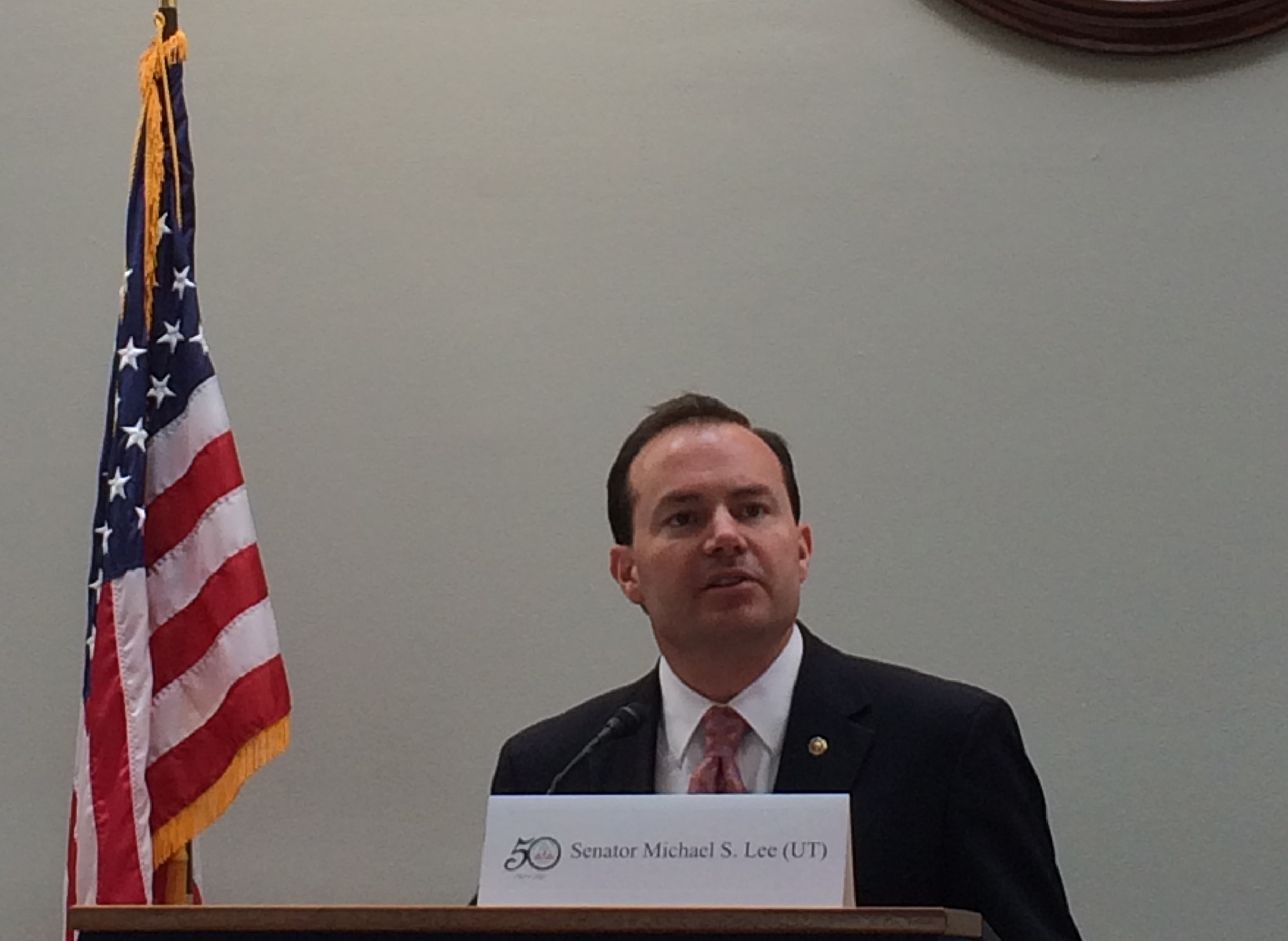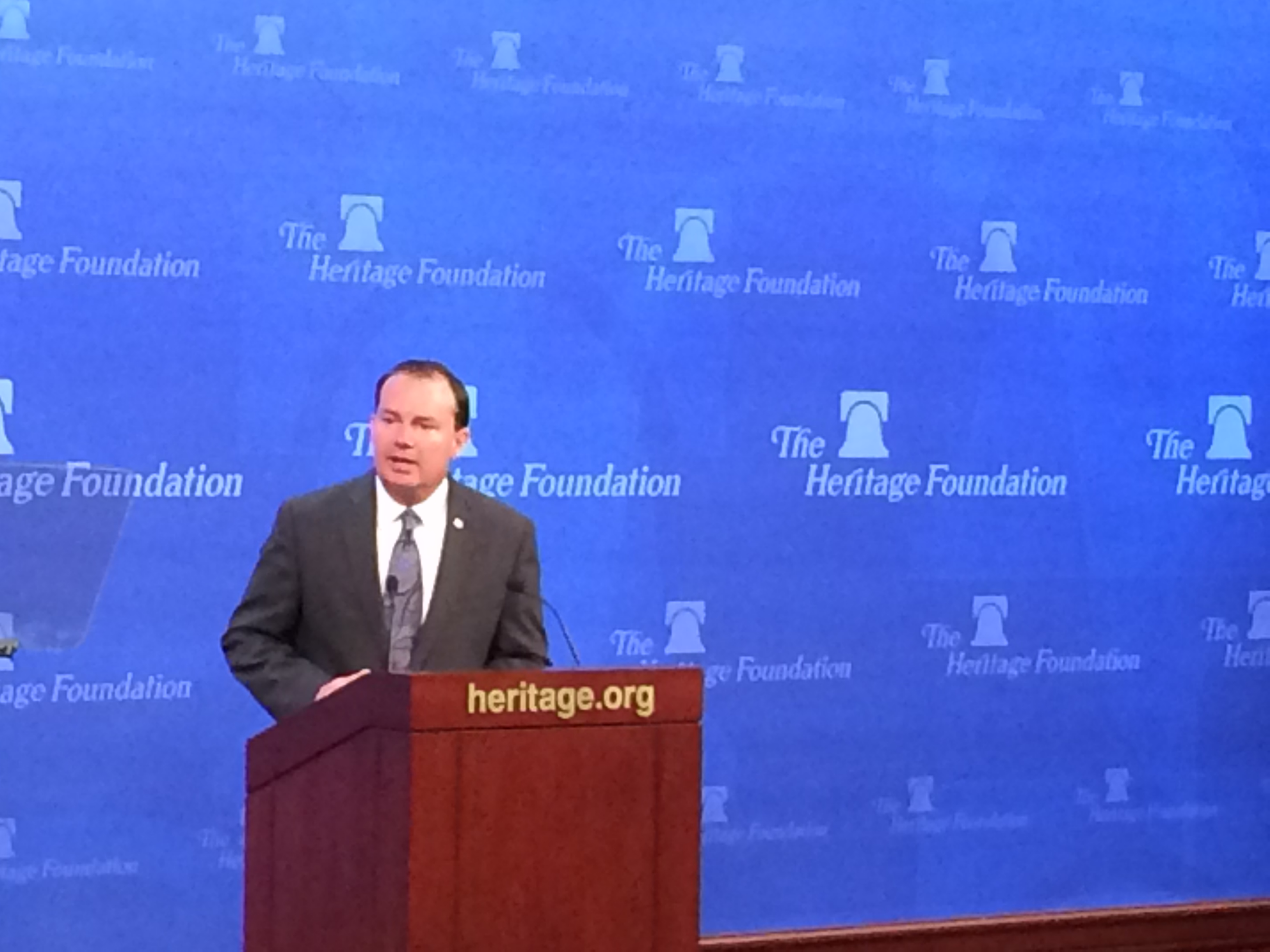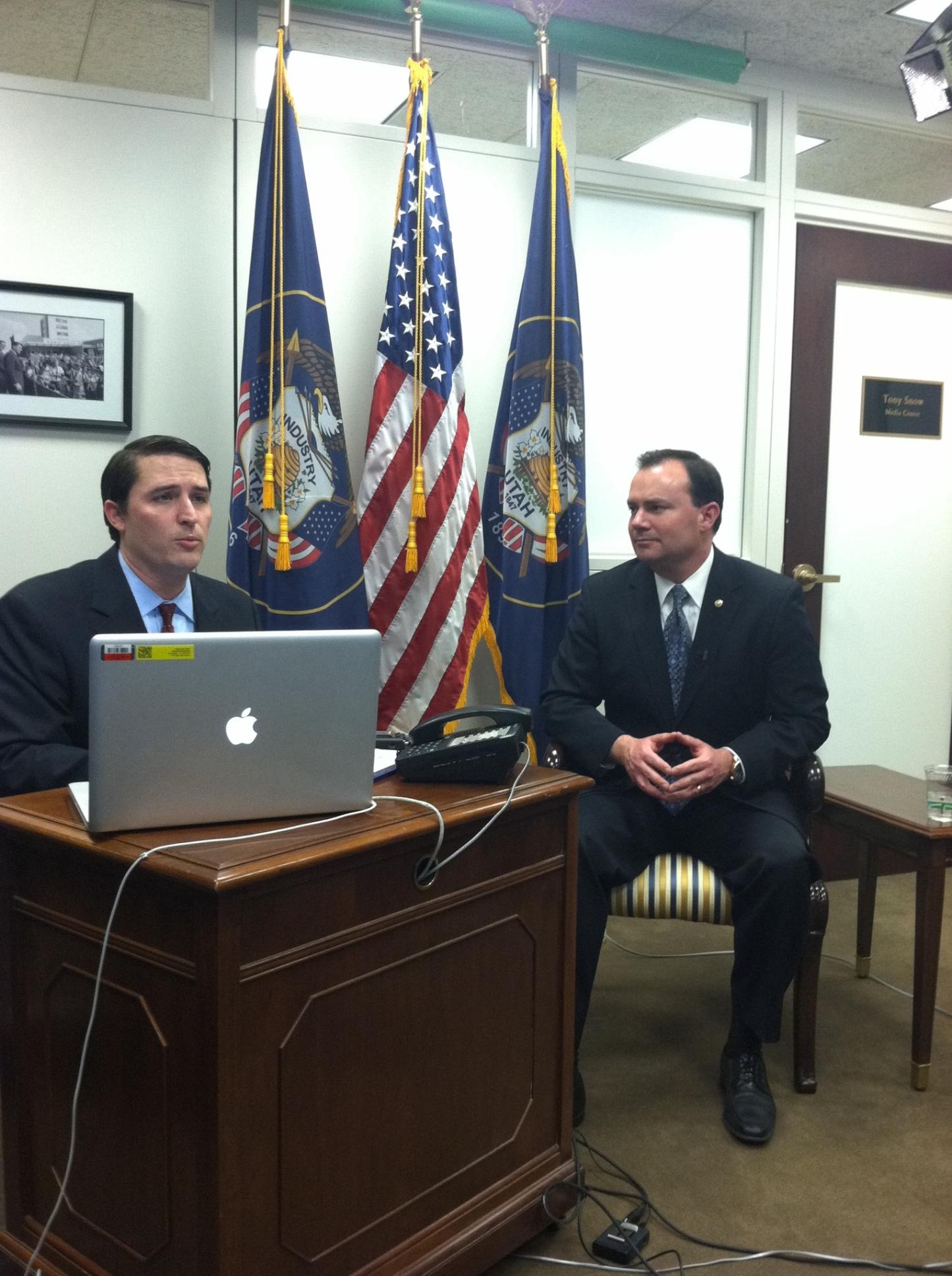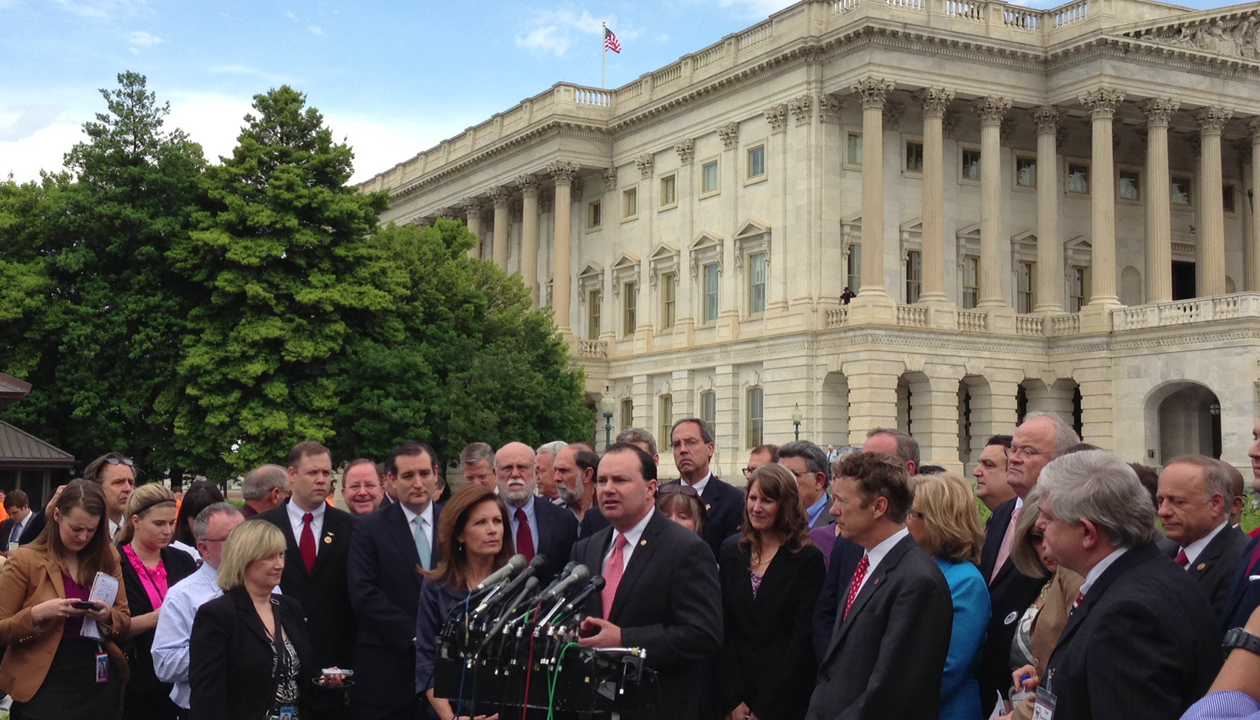Ensuring Programs We Fund Actually Work
Jun 25, 2014
Senator Lee describes an amendment he introduced to the Workforce Innovation and Opportunity Act that would penalize the Secretary of the Department of Labor for not fulfilling required evaluations of taxpayer-funded programs.
Criminal Law and the Administrative State: Defining and Enforcing Regulatory Crimes
May 14, 2014

In an influential law review article, the late Professor Bill Stuntz noted the academic consensus lamenting criminal law’s constantly expanding breadth. Professor Stuntz wrote that virtually all scholarship in the field “consistently argues that existing criminal liability rules are too broad and ought to be narrowed.” But, Professor Stuntz continued ominously,
Western Caucuses Urge EPA to Halt “Waters of the US" Rule
May 8, 2014
WASHINGTON, D.C. –Today, Senator Mike Lee joined Senate Western Caucus Chairman John Barrasso (R-WY) and Congressional Western Caucus co-chairs Stevan Pearce (R-NM) and Cynthia Lummis (R-WY) and 42 other Caucus Members in sending a letter to Environmental Protection Agency (EPA) Administrator Gina McCarthy.
In their letter, the Caucus members call on the EPA to refrain from moving forward with their controversial “Waters of the U.S.” (WOTUS) rule that will drastically expand federal regulatory authority under the Clean Water Act. The members also highlight how this rule will negatively impact farms, small businesses, energy production, commercial development and substantially interfere with the ability of individual landowners to use their property.
“We urge you to change course by committing to operating under the limits established by Congress, recognizing the states’ primary role in regulating and protecting their streams, ponds, wetlands and other bodies of water. We also again ask that you consider the economic impacts of your policies knowing that your actions will have serious impacts on struggling families, seniors, low-income households and small business owners,”Caucus Members wrote.
In addition to Barrasso, Pearce and Lummis, the letter was signed by Senators David Vitter (R-LA), Jim Inhofe (R-OK), Lisa Murkowski (R-AK), Dean Heller (R-NV), Mike Lee (R-UT), Pat Roberts (R-KS), Orrin Hatch (R-UT), John Thune (R-SD), Mike Crapo (R-ID), Roy Blunt (R-AR), Jerry Moran (R-KS), Deb Fischer (R-NE), John Cornyn (R-TX), John Hoeven (R-ND), Mike Johanns (R-NE), James Risch (R-ID) and Mike Enzi (R-WY) and Representatives Rob Bishop (UT-01), Markwayne Mullin (OK-01), Jeff Denham (CA-10), Mike Simpson (ID-02), Don Young (AK-AL), Walter Jones (NC-03), Matt Salmon (AZ-05), Scott Tipton (CO-03), Mike Conaway (TX-11), Mark Amadei (NV-02), Cory Gardner (CO-04), Jeff Duncan (SC-03), Chris Stewart (UT-02), Paul Gosar (AZ-04), Tom McClintock (CA-04), Kevin Cramer (ND-AL), Devin Nunes (CA-22), David Schweikert (AZ-06), Randy Neugebaurer (TX-19), Raul Labrador (ID-01), Kristi Noem (SD-AL), Doug Lamborn (CO-05), Trent Franks (AZ-08), Paul Broun (GA-10), Mike Coffman (CO-06), Jason Chaffetz (UT-03).
The full text of the letter:
May 8, 2014
The Honorable Gina McCarthy
Administrator
Environmental Protection Agency
1200 Pennsylvania Avenue, N.W.
Washington, DC 20460
Dear Administrator McCarthy,
As members of the Senate and Congressional Western Caucuses, we are contacting you regarding our opposition to the Environmental Protection Agency’s (EPA) efforts to significantly expand federal regulatory authority under the Clean Water Act (CWA).
We have reviewed the proposed rule that you signed on March 25th and have concluded that the rule provides essentially no limit to CWA jurisdiction. This is despite the Supreme Court consistently recognizing that Congress limited the authority of the EPA and the Army Corps of Engineers under the CWA.
There has been strong opposition to EPA’s approach due to the devastating economic impacts that a federal takeover of state waters would have. Additional and substantial regulatory costs associated with changes in jurisdiction and increased permitting requirements will result in bureaucratic barriers to economic growth, negatively impacting farms, small businesses, commercial development, road construction and energy production, to name a few.
The threat of ruinous penalties for alleged noncompliance with the CWA is also likely to become more common given the proposed rule’s expansive approach. For example, the EPA’s disputed classification of a small, local creek as a “water of the United States” could cost as much as $187,500 per day in civil penalties for Wyoming resident Andrew Johnson. Similar uncertainty established under the proposed rule will ensure that expanding federal control over intrastate waters will substantially interfere with the ability of individual landowners to use their property.
We share the concerns expressed by the Western Governors Association regarding the lack of meaningful state consultation in crafting this rule. The Western Governors stated in a letter to you on March 25th that they –
“are concerned that this rulemaking was developed without sufficient consultation with the states and that the rulemaking could impinge upon state authority in water management.”
We fail to understand why the EPA has not adequately consulted our Governors about a rule that has such a significant impact on the economy of our states. For example, rural states in the West have sizeable ranching and farming operations that will be seriously impacted by this rule. Despite the claim that the Army Corps will exempt 53 farming practices as established by the Natural Resource Conservation Service, the list of 53 does not cover all existing agricultural practices. There are a number of farming and ranching practices, such as the application of pesticides, that are not covered on this list that occur every day in the West without penalty. Under this new proposed rule, it appears those farmers and ranchers will need to get a permit or be penalized if they continue to use those non-covered practices in new federal waters.
Congress has demonstrated strong opposition to past efforts to have the federal government control all wet areas of the states. During the recent consideration of the Water Resources Development Act (WRDA), a bipartisan group of Senators voted 52 to 44 to reject the EPA’s CWA Jurisdiction Guidance, which would have also resulted in effectively unlimited jurisdiction over intrastate water bodies. Efforts to pass legislation to have the federal government control all non-navigable waters have also failed in past Congresses.
We urge you to change course by committing to operating under the limits established by Congress, recognizing the states’ primary role in regulating and protecting their streams, ponds, wetlands and other bodies of water. We also again ask that you consider the economic impacts of your policies knowing that your actions will have serious impacts on struggling families, seniors, low-income households and small business owners.
In their letter, the Caucus members call on the EPA to refrain from moving forward with their controversial “Waters of the U.S.” (WOTUS) rule that will drastically expand federal regulatory authority under the Clean Water Act. The members also highlight how this rule will negatively impact farms, small businesses, energy production, commercial development and substantially interfere with the ability of individual landowners to use their property.
“We urge you to change course by committing to operating under the limits established by Congress, recognizing the states’ primary role in regulating and protecting their streams, ponds, wetlands and other bodies of water. We also again ask that you consider the economic impacts of your policies knowing that your actions will have serious impacts on struggling families, seniors, low-income households and small business owners,”Caucus Members wrote.
In addition to Barrasso, Pearce and Lummis, the letter was signed by Senators David Vitter (R-LA), Jim Inhofe (R-OK), Lisa Murkowski (R-AK), Dean Heller (R-NV), Mike Lee (R-UT), Pat Roberts (R-KS), Orrin Hatch (R-UT), John Thune (R-SD), Mike Crapo (R-ID), Roy Blunt (R-AR), Jerry Moran (R-KS), Deb Fischer (R-NE), John Cornyn (R-TX), John Hoeven (R-ND), Mike Johanns (R-NE), James Risch (R-ID) and Mike Enzi (R-WY) and Representatives Rob Bishop (UT-01), Markwayne Mullin (OK-01), Jeff Denham (CA-10), Mike Simpson (ID-02), Don Young (AK-AL), Walter Jones (NC-03), Matt Salmon (AZ-05), Scott Tipton (CO-03), Mike Conaway (TX-11), Mark Amadei (NV-02), Cory Gardner (CO-04), Jeff Duncan (SC-03), Chris Stewart (UT-02), Paul Gosar (AZ-04), Tom McClintock (CA-04), Kevin Cramer (ND-AL), Devin Nunes (CA-22), David Schweikert (AZ-06), Randy Neugebaurer (TX-19), Raul Labrador (ID-01), Kristi Noem (SD-AL), Doug Lamborn (CO-05), Trent Franks (AZ-08), Paul Broun (GA-10), Mike Coffman (CO-06), Jason Chaffetz (UT-03).
The full text of the letter:
May 8, 2014
The Honorable Gina McCarthy
Administrator
Environmental Protection Agency
1200 Pennsylvania Avenue, N.W.
Washington, DC 20460
Dear Administrator McCarthy,
As members of the Senate and Congressional Western Caucuses, we are contacting you regarding our opposition to the Environmental Protection Agency’s (EPA) efforts to significantly expand federal regulatory authority under the Clean Water Act (CWA).
We have reviewed the proposed rule that you signed on March 25th and have concluded that the rule provides essentially no limit to CWA jurisdiction. This is despite the Supreme Court consistently recognizing that Congress limited the authority of the EPA and the Army Corps of Engineers under the CWA.
There has been strong opposition to EPA’s approach due to the devastating economic impacts that a federal takeover of state waters would have. Additional and substantial regulatory costs associated with changes in jurisdiction and increased permitting requirements will result in bureaucratic barriers to economic growth, negatively impacting farms, small businesses, commercial development, road construction and energy production, to name a few.
The threat of ruinous penalties for alleged noncompliance with the CWA is also likely to become more common given the proposed rule’s expansive approach. For example, the EPA’s disputed classification of a small, local creek as a “water of the United States” could cost as much as $187,500 per day in civil penalties for Wyoming resident Andrew Johnson. Similar uncertainty established under the proposed rule will ensure that expanding federal control over intrastate waters will substantially interfere with the ability of individual landowners to use their property.
We share the concerns expressed by the Western Governors Association regarding the lack of meaningful state consultation in crafting this rule. The Western Governors stated in a letter to you on March 25th that they –
“are concerned that this rulemaking was developed without sufficient consultation with the states and that the rulemaking could impinge upon state authority in water management.”
We fail to understand why the EPA has not adequately consulted our Governors about a rule that has such a significant impact on the economy of our states. For example, rural states in the West have sizeable ranching and farming operations that will be seriously impacted by this rule. Despite the claim that the Army Corps will exempt 53 farming practices as established by the Natural Resource Conservation Service, the list of 53 does not cover all existing agricultural practices. There are a number of farming and ranching practices, such as the application of pesticides, that are not covered on this list that occur every day in the West without penalty. Under this new proposed rule, it appears those farmers and ranchers will need to get a permit or be penalized if they continue to use those non-covered practices in new federal waters.
Congress has demonstrated strong opposition to past efforts to have the federal government control all wet areas of the states. During the recent consideration of the Water Resources Development Act (WRDA), a bipartisan group of Senators voted 52 to 44 to reject the EPA’s CWA Jurisdiction Guidance, which would have also resulted in effectively unlimited jurisdiction over intrastate water bodies. Efforts to pass legislation to have the federal government control all non-navigable waters have also failed in past Congresses.
We urge you to change course by committing to operating under the limits established by Congress, recognizing the states’ primary role in regulating and protecting their streams, ponds, wetlands and other bodies of water. We also again ask that you consider the economic impacts of your policies knowing that your actions will have serious impacts on struggling families, seniors, low-income households and small business owners.
Opportunity, Cronyism, and Conservative Reform
Apr 30, 2014

It is always a privilege to be back at the Heritage Foundation, the heart of America’s conservative movement. And it is to that broad, diverse movement that I have come to speak today about an issue with the potential to unify and revive our coalition.
Reducing the Burdens of Public Land
Jan 15, 2014
Beside me is a map of the United States. In red, you can see all the land that is owned by the federal government. As you can see by looking at the map, most of the land west of the Rocky Mountains, more than 50% in fact, is owned by the federal government.
Highlights from Senator Lee's October Tele-townhall
Oct 15, 2013

On October 9, Senator Lee hosted one of his monthly tele-townhall meetings. You can find some of the highlights from the event in the video below.
Lee Opposes the Metal Theft Prevention Act
Jun 13, 2013
In my view, this bill exceeds Congress’s power under the Commerce Clause and imposes a federal regulatory scheme in an area of law the Constitution reserves to the states. In the interest of maintaining the balance between state and federal authority, I will vote against reporting this bill from the Judiciary Committee.
The Obama Scandals Aren’t About Bad Government, but Big Government
May 16, 2013

The more power any government has, the more power it will abuse. The more money it spends, the more money it will mis-spend. Dysfunction and corruption grow on government like mold on otherwise perfectly good bread.
LEE: IRS Scandal More Than Just Partisan Fighting
May 15, 2013
It would be a mistake for Republicans to view the latest IRS scandal as a typical partisan squabble between political parties. The real lesson is that our massive federal government bureaucracy is inherently dysfunctional, corrupt, and intolerant regardless of who is in charge.
Lee Applauds Senate for Debating a Budget
Mar 22, 2013
The United States Senate is famously referred to as the “world’s greatest deliberative body.” For the first time in four years, this great institution will live up to its reputation, as it moves to debate a federal budget. The budget is the one bill every year to which any Senator can offer an amendment on almost any topic.
